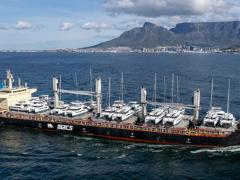Following the implementation of the Reporting of Conveyances and Goods (RCG) project under the New Customs Act Programme (NCAP) on April 20, couriers have been advised to focus on getting their reporting compliance to “acceptable levels”, according to South African Revenue Service Customs executive, Beyers Theron.
“Compliance with reporting obligations commenced on the day of the implementation, but Sars has agreed not to impose penalties for non-compliance before August 1 this year,” he said.
The heads of the Customs Committee for the South African Express Parcel Association (Saepa), Jason Blackman and Marius Volschenk, told FTW the RCG regulations “significantly improve cargo management and supply chain security”.
They added, however, that RCG – which includes import, export and transhipment reporting – introduced a number of new supply chain reports, including pre-loading notices for containerised cargo, gate reports, arrival reports to port and airport authorities, and notices to terminals and depots. Furthermore, where the current Sars Manifest Processing (MPR) system only affected express parcel imports, RCG is applicable to imports and exports. Blackman and Volschenk said they had collated feedback from Saepa members and submitted commentary to Sars on concerns and potential hindrances to trade if these concerns were not recognised and, subsequently, addressed.
“Sars has been extremely understanding and has been meeting with industry on a regular basis. It was made clear from the outset that the stakeholder would be supported throughout the implementation process,” said Volschenk, pointing out that senior Sars managers and executives were available to answer questions, give guidance and listen to concerns during the extensive road shows held by the revenue authority.
According to Saepa, Sars has also published specific Message Implementation Guidelines (MIGs) relating to the various conveyance and electronic cargo messages that need to be submitted to the Revenue Authority.
“They also held detailed technical discussions with various software developers on system development requirements,” said Blackman. FTW understands from industry feedback that one of the biggest concerns is around the clearance of low value bulk goods (LVB), with Blackman pointing out that the LVB simplified clearance process remained in place.
“Sars has implemented a more automated and electronic process at OR Tambo International Airport (Ortia), bridging the gap towards the full automation that will form part of the phased NCAP implementation at a later stage,” added Volschenk.












